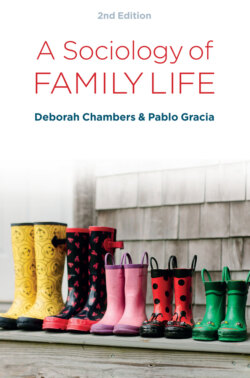Читать книгу A Sociology of Family Life - Deborah Chambers - Страница 10
1 Traditional Approaches to the Family
ОглавлениеThis chapter outlines key approaches to family and kinship studies from the late nineteenth to the mid twentieth century. Sociological accounts of family and personal relationships in the nineteenth and early twentieth centuries were characterized by anxieties about the decline of traditional family values. Still in evidence today, this perception of ‘family decline’ forms part of a broader set of concerns about the breakdown of community ties. Rising individualism and privatization are identified as being among the causes. During the nineteenth to the early twentieth centuries, it was argued that neighbours no longer supported or knew one another; families were more insular; traditional forms of respect and deference were weakening; and individuals were becoming more self-absorbed and materialistic. By the mid twentieth century, these fears of moral decline coincided with anxieties about the break-up of the nuclear family. It was feared that rising individualism would lead to an abandonment of marriage, particularly by women. Against this backdrop, two enduring but opposing views have steered debates about the family, namely: (1) a consensus approach that accents the role of families in creating social cohesion and supporting the social order; and (2) a conflict approach that explains how power relations within and outside the family structure societies.
This chapter introduces a series of themes that highlight these opposing views. The first theme concerns late nineteenth-century perspectives that aimed to prove or disprove the universality of a particular kind of family. Late nineteenth-century anthropological influences on early sociological debates in Europe and North America are outlined. These perspectives contrasted radically with the socialist study of the family developed by Frederick Engels, forming the second theme of this chapter. Engels associated women’s oppression with the rise of the patriarchal family and private property during a particular historic phase. He explained that women’s low status was directly related to production, reproduction and capitalism. The third theme is the notion of the ‘functional family’ which relates to early and mid-twentieth-century moral anxieties about a decline of family values. Most early twentieth-century theories about the family examined the effects of industrialization and urbanization on family structures. The academic endorsement of a ‘functional family’ is set against the backdrop of moral anxieties prompted by the transformation of the family from a producing to a consuming unit.
The fourth theme is the idea of the ‘companionate marriage’, which was introduced to deal with these moral anxieties. The idea that the family was moving from being an institution, involving extended kin, to a relationship of friendship between couples was a response to fears about the breakdown of traditional values. Conjugal friendship marriage was presented as an exclusive affiliation between couples, and perceived as emotionally and physically fulfilling for both partners.
The fifth theme concerns sociological studies that contradicted notions of moral decline and a weakening of family ties. The classic British urban community studies of kinship during the 1950s and early 1960s provided empirical research evidence that refuted sociological anxieties about family and community decline. The issues of race and ethnicity comprise the following theme. Functionalist approaches and dominant conservative views on the family during the 1950s and 1960s typically disregarded the distinctive histories, cultures and socio-economic inequalities that disadvantaged Black families and minority ethnic groups. The chapter’s final theme involves feminist debates of the 1970s and 1980s that identified and critiqued patriarchal assumptions made in earlier sociological studies. Feminist scholars exposed the ideological nature of gendered power relations and the structural constraints placed on women both in the family and in other areas of society, including the use of women as a reserve army of labour, gender-segregated employment, and low pay for women. Feminist approaches prefigured the rise of more recent queer theories, from the 1990s. These new social theories influenced contemporary sociological debates about gender relations and sexual identities by drawing attention to the fluidity and changing meanings of ‘family’ and personal relationships
